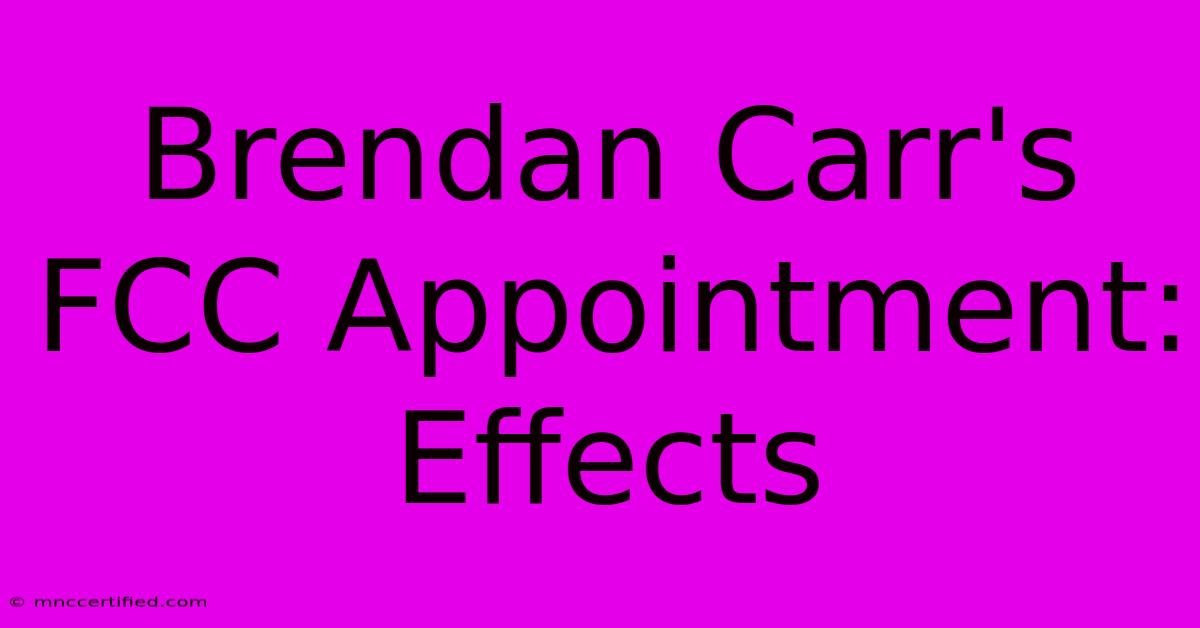Brendan Carr's FCC Appointment: Effects

Table of Contents
Brendan Carr's FCC Appointment: Lasting Effects on Telecommunications and Media
Brendan Carr's tenure as an FCC Commissioner, from 2017 to 2023, left a significant mark on the US telecommunications and media landscape. His conservative stance and outspoken advocacy for deregulation sparked considerable debate and had far-reaching consequences. This article delves into the key effects of his appointment, examining both the intended and unintended outcomes of his policies.
Key Policy Initiatives and Their Impacts
Carr's time at the FCC was characterized by several key policy initiatives, each with its own set of impacts:
1. Net Neutrality Rollback: A Defining Moment
Arguably Carr's most impactful action was his pivotal role in the 2017 rollback of net neutrality rules. He vehemently opposed the principle of net neutrality, arguing that it stifled innovation and competition. The repeal, which eliminated the requirement for internet service providers (ISPs) to treat all online traffic equally, sparked widespread protests and legal challenges.
- Impact: The rollback led to concerns about increased internet costs, throttling of certain content, and the potential for ISPs to favor specific services. While the immediate impact was debated, the long-term effects are still unfolding, with ongoing discussions about the need for renewed net neutrality protections. This remains a highly contentious issue with significant ongoing SEO relevance.
2. Focus on 5G Deployment and Infrastructure: A Positive Aspect?
Carr championed policies aimed at accelerating the deployment of 5G networks across the US. He advocated for streamlining regulatory processes and reducing bureaucratic hurdles to encourage private sector investment in infrastructure development.
- Impact: While undeniably contributing to the expansion of 5G infrastructure, critics argued that Carr's approach prioritized speed over careful consideration of potential negative consequences, such as environmental concerns and the potential for increased digital divide disparities. The long-term economic and social effects of this accelerated deployment require further analysis and ongoing monitoring.
3. Scrutiny of Big Tech: A Shifting Landscape
During his tenure, Carr increasingly focused his attention on the power and influence of large technology companies. He championed investigations into alleged anti-competitive practices and advocated for stronger regulatory oversight.
- Impact: This increased scrutiny contributed to a broader national conversation about the role and regulation of Big Tech. While some lauded his efforts to hold these companies accountable, others criticized his approach as politically motivated and potentially harmful to innovation. The debate continues, impacting future legislation and regulatory actions.
4. Media Ownership Rules: Relaxation and its Consequences
Carr also supported efforts to relax certain media ownership rules, arguing that they were outdated and hindered competition. This stance aligned with his broader philosophy of deregulation.
- Impact: The relaxation of these rules raised concerns about media consolidation and the potential for reduced diversity of voices in the media landscape. This remains a significant area of ongoing debate and research.
Long-Term Effects and Ongoing Debate
The long-term effects of Brendan Carr's time at the FCC are still being felt and debated. His legacy is complex and multifaceted, with both proponents and critics offering compelling arguments.
The ongoing debate revolves around several key issues:
- The balance between deregulation and consumer protection: This remains a central theme in the ongoing discussions about the future of telecommunications and media regulation.
- The impact of 5G deployment on the digital divide: Ensuring equitable access to high-speed internet remains a critical challenge.
- The appropriate level of regulatory oversight for Big Tech: Balancing innovation with accountability continues to be a central focus of policy debates.
- The evolving media landscape and the need for adaptive regulatory frameworks: The rapid pace of technological change necessitates a dynamic approach to regulation.
Understanding the effects of Brendan Carr's FCC appointment requires careful consideration of these diverse and interconnected issues. His tenure undoubtedly left a lasting imprint on the regulatory landscape, shaping the current environment and influencing future policy debates in the US telecommunications and media sectors. The ongoing discussion and research surrounding these topics ensure this will continue to be a highly relevant and searched topic online.

Thank you for visiting our website wich cover about Brendan Carr's FCC Appointment: Effects. We hope the information provided has been useful to you. Feel free to contact us if you have any questions or need further assistance. See you next time and dont miss to bookmark.
Featured Posts
-
Whats On Cny Thanksgiving 2024
Nov 19, 2024
-
Brendan Carr After Project 2025s Fcc Role
Nov 19, 2024
-
Croatia Vs Portugal Live Uefa Nations League
Nov 19, 2024
-
Is Gum Graft Covered By Insurance
Nov 19, 2024
-
Bo Nix For Fed Ex Player Of The Week
Nov 19, 2024